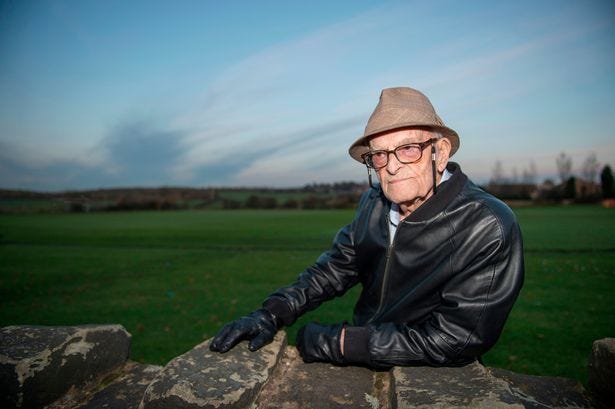It was over eighty years ago, but I can still vividly remember 1930 because you never forget hunger. 1930 was a year of famine for me, my family and working-class Britain. That year hunger gnawed at the bonds that held our family together and broke them apart. My parent's marriage ended that year- love can not be nourished on an empty belly. Despite being only seven, 1930 also ended my childhood as I learned my mother did not have the emotional strength to protect me, from a harsh world.
At the start of 1930, both fuel and food were scarce for us and everyone else without work. I still remember my mother on bleak winter mornings reheating for breakfast the porridge we consumed, for supper the night before. While she dolloped it out into our bowls, I'd sing;
“Old Mother Hubbard went to the cupboard to give the poor dog a bone.
But when she got there the cupboard was bare and so the poor doggie had none.” .
That year in February, as a birthday gift, my dad found a few spare pennies and took me to the Alhambra Theatre to watch a pantomime of Humpty Dumpty. He could only afford the cheapest of seats which were high up in the theatre. While we climbed to them, my dad said, "mind you don't bump your head on a nearby cloud." But I didn't care. I had never been to the theatre, and I was just thrilled to be in the company of my dad. When the performance was over, I felt I had been touched by magic. However, that feeling of exaltation didn't last long. My joy from that afternoon matinee was quickly dissipated by my grim living conditions, as well as witnessing my parent's marriage founder on the sharp rocks of poverty, infidelity and mutual recriminations.
Heartache and unhappiness surrounded me because my mother's affair with Mr O'Sullivan was causing extreme discord within our family. My mother was desperate for love, for an escape from our poverty. She blamed my dad for our circumstances and berated him in front of me and my sister. My dad was terrified of being abandoned by her and losing his children. He was old, unemployable and outside of my mum, and my sister and I had no family. Without us, he was alone in a world that treated the vulnerable with great cruelty. So, he acted no better towards my mother than she did to him. There were arguments, yelling, and hurtful things said to each other, but never any physical violence. Much later, my mum learned, the hard way, my dad was the exception, when it came to husbands not striking their wives in the 1930s.
After my birthday, something snapped in my mum, and she concluded enough was enough for her. She deluded herself into believing that O'Sullivan could save her and her children from the Dickensian poverty we lived in and ran away with him to start a new life. I think she believed she could fix things, for all of us if she ran off with O'Sullivan. In her delusion, my mother believed, in time, her children would come to live with her and Mr. O’ Sullivan.
My mum fled to St Albans like a working-class Anna Karenina, with Mr. O'Sullivan as her Vronsky. My family waited through the early spring for news of my mother but none came. During that time, my dad, my sister and I survived on handouts, begging and sometimes the pity of my mum's relations who came over to our doss house and paid the arrears on our rent or provided some leftover food from their table. My dad tried to be strong for his children, but 1930 beat him like a vicious drunk beats their disobedient dog. My father emotionally retreated from his children and the reality of our destitution. On some occasions, I found him staring at the grimy walls of the room we lived in, with tears rolling down his face. However, most days, he escaped the world by taking long walks around the city of Bradford or by reading from his eight-volume encyclopedia of the ancient world.
I would not have survived those first few months of 1930 without my sister Alberta. I shared my hunger with Alberta, and that made it less lonely because the adult world had abandoned us. Alberta was only ten, but I thought she was as fierce as a lion because she knew how to scoff food from the rooms of other lodgers. As best she could, Alberta protected me and ensured I did not die at the age of seven.
My mum returned to us from St Albans at the end of spring as if nothing had happened. I remember she stood at the front entrance to the room we rented like someone who had just stepped out a few minutes before to fetch some milk. My mother walked back into our lives, after being gone for a few months, holding a pineapple in one hand as if she had just arrived home from Captain Cooke’s expedition to the South Seas. In the other hand, my mum carried “authentic Irish soda bread.” She was alone and at least for that night, no one bothered to ask what had happened to Mr. O'Sullivan. Mary and I ate large portions of the Irish soda bread with a weak and meatless broth for our tea that evening. The pineapple, however, was never offered up for us to eat. Instead, my mum showed it around to the other lodgers to demonstrate the wonders and oddities found in London.



